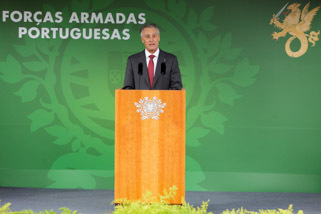
Honourable Mayor,
Honourable Speaker of the Municipal Assembly,
Ladies and Gentlemen,
We celebrate, in 2008, the 750 years of the Charter of Viana do Castelo, granted by King D. Afonso III. We also celebrate the 160 years of its being granted city status by decree of Queen D. Maria II. And we equally celebrate the 130 years of the railroad reaching Viana do Castelo.
In this historic year for Viana do Castelo, it was my idea that the celebrations of the National Day of Portugal and the Communities should take place in this beautiful city which has been Portugal since its first moment.
I wish to thank all the people of Viana do Castelo and, particularly the City Council, represented by its Mayor, for all their cooperation and the keenness which they placed upon these celebrations.
Our setting is the shores of the River Lima, the water course that the Roman legionnaires found at the end of their conquest and confused for the legendary River of Oblivion. Whoever crossed to the other shore, they believed, would lose the memory of his past, of his family and of his homeland. Nothing worse could happen to them.
Their general, Decius Junius Brutus, had to cross the river himself, conquering the fear he surely felt, to demonstrate that this was not the land of oblivion, but a land of live memory.
“Since the memory of man is unstable, writing was the remedy found so that the acts of mortals become firm and reach those who come in the future.”
This notable tract from the Charter of Viana do Castelo stresses, in the words of D. Afonso III, the importance of preserving collective memory.
In the Province of Minho with its eternal greenery, between the mountains and the sea, the nucleus of the Land of Portucale, the memory of a fortress culture is kept, as well as a long tradition of resistance that has always served our cause in difficult moments.
In this city facing the south, overlooking the world we discovered, the memory is also kept of a Portugal that refused to confine itself to a corner of a European peninsula and accepted the challenge of distance and the unknown.
I recall the figure of Diogo Álvares, a native of Viana do Castelo who, as so many others, departed from here, facing, in the words of Camões:
“(…) as várias partes que os insanos
Mares dividem, onde se apousentam
Várias nações, que mandam vários Reis,
Vários costumes seus e várias leis.”
[“(…) the various parcels that the insane
Seas divide, which various nations occupy,
Where various Kings reign, over various of
Their customs and their various laws.”]
I see Diogo Álvares, who in Brazil was a mediator between men and cultures, as an example of a Portuguese man of the world, one of the Portuguese who brought the peoples globally together.
In the Minho of devotions and reverences, of pilgrimages and processions, of brotherhoods and fraternities, the memory is also kept of Frei Bartolomeu dos Mártires, a humble but firm herald of the truth in front of the great, an obstinate defender of his country’s interests.
In compliance with the national duty of recognition with this great Portuguese, who chose Viana do Castelo to live out his last days and that the people here decided should rest for ever in these lands, I paid public tribute today to the singular figure of Frei Bartolomeu dos Mártires.
The world we live in rewards those that accept a universal destiny without losing the chains of memory. In Viana, keeper of memory, conqueror of the River of Oblivion, we find threads that bind us in time, indestructible threads such as the gold necklaces that the Minho mother leaves to her daughter in a chain that is a live bond between generations.
The memory of Portugal is defended here with the same strength with which the most intimate recollections are preserved in these jewels so akin to the Viana goldsmith’s art: memories, pieces which are lovingly kept in their safe as a recollection or nostalgia. .
Such is Viana do Castelo, a city open to the sea and to the world, welcoming with its traditional hospitality the National Day of Portugal, Camões and the Communities.
“Havemos de ir a Viana,
Ó meu amor de algum dia”
[“We shall go to Viana,
Oh my love of some day.”]
As Amália Rodrigues sang the words of Pedro Homem de Mello.
In this Day of Portugal, Portugal came to Viana.
We renew the recollection of what we are and the wish of what we can be. We again conquered the River of Oblivion.
But memory,
“(…) é como o vento,
Quem pára perde-lhe o jeito,
E morre a todo o momento.”
[“(…) is like the wind,
Whoever stops loses its shape
And dies at any moment”]
We shall come back to Viana, some day. Very soon, certainly.
Thank you very much.
© 2006-2016 Presidency of the Portuguese Republic
You have gained access to the records of the Official Site of the Presidency of the Republic from 9 March 2006 to 9 March 2016.
The contents available here were entered in the site during the 10 year period covering the two mandates of President of the Republic Aníbal Cavaco Silva.